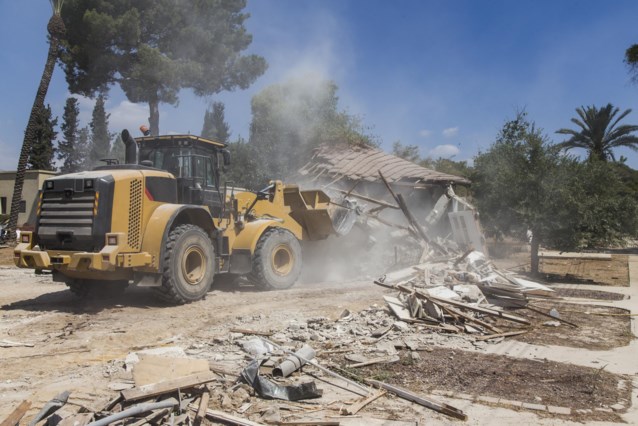“The international legal net around Israel is closing,” says Willem Staes, Middle East expert at 11.11.11. He refers to the international arrest warrant against Netanyahu and his former Defense Minister, Yoav Gallant, but also to, among other things, the ongoing genocide case against Israel. “And yet the banks continue to persist in their policy.”
According to the NGO umbrella group, the figures don’t lie: between January 2021 and August 2024, BNP Paribas invested $32.72 billion in the Israeli settlement industry. BNP Paribas’ portfolio includes companies that supply components for spy equipment, settlement construction companies, suppliers of demolition equipment and weapons suppliers to the Israeli army. As in previous years, the bank is number one as the largest European financier.
KBC: “wrong conclusions”
This year, the NGOs are also hitting out at KBC. They accuse the bank of doubling its investment in the “bulldozer of ethnic cleansing”. According to the study, KBC’s loan to Caterpillar rose to $772 million last year. “Caterpillar has been actively involved in the destruction of Palestinian homes and their forced displacement for decades. There is even an army unit named after their military D9 bulldozer that is leaving a trail of destruction through Gaza,” says Staes. 11.11.11 refers to social media, where the unit claims their job is to “destroy Gaza.” KBC’s total investments amount to 1.918 billion dollars.
KBC states that it cannot respond to individual cases due to banking secrecy. The bank does say that the report uses incorrect figures that lead to “erroneous, tendentious conclusions”. The bank also says it complies with international law and is concerned about the situation in the Middle East and the consequences for the civilian population.
Belfius, ING, Argenta
State bank Belfius finances companies worth 185 million dollars that are active in, among other things, the demolition of Palestinian houses, the supply of surveillance equipment and the illegal exploitation of Palestinian natural resources. ING (8.352 billion), Delen Private Bank (687 million), Bank Degroof Petercam (493 million) and Argenta (43 million) are also mentioned in the report. Axa gets a small compliment: the French insurance company withdrew in June 2024 from three Israeli banks that play a key role in the settlement industry.
BNP Paribas denies
In a response, BNP Paribas strongly rejects the report’s conclusions. Michael Anseeuw, CEO of BNP Paribas Fortis, calls the data used misleading and states that the bank is mainly targeted because of its size as the largest banking player in the euro zone. The bank denies any involvement in arms purchases in the Middle East and emphasizes that it has no activities or branches in the occupied territories or Israel. This year, according to Anseeuw, there have already been about fifty vandalism actions against bank offices by Palestine activists.
However, Staes rejects the argument that BNP Paribas is wrongly in the spotlight due to its size. “Look at the long list of problematic companies in which BNP is investing tens of billions of dollars. Roughly speaking, Elbit is the main supplier of weapons to the Israeli army. That is a deliberate choice by BNP,” he says.
A company like Caterpillar does more than just build military bulldozers, it also builds roads and makes generators, but “that is also a non-argument,” says Staes. “International frameworks, which have also been endorsed by KBC, are very clear: as soon as a company is potentially involved in serious violations of international law, it does not matter whether that comprises 1 percent or 50 percent of their activities.”
National Bank denies
The National Bank of Belgium (NBB) also appears in the report for the first time, with a modest amount of 5 million dollars. This concerns investments in a tourism provider in illegal settlements and in spy equipment. “It is a small amount, but as a national bank you have an exemplary role. However, the international frameworks are clear,” says Staes.
The National Bank says it will respond exceptionally to the allegations, given the “potential commotion”. The bank denies having or ever having had the two companies referred to in the report in its investment portfolio. “This applies to all portfolios for which we are responsible. We therefore do not know what the information from 11.11.11 is based on,” it said.
“Finally taking action”
According to Fairfin and 11.11.11, Belgian banks must take their responsibility and stop investing in companies involved in illegal settlements and in Gaza. As a shareholder of BNP Paribas and owner of Belfius, the federal government must force them to revise their policy, and the NBB must also be called to account, it is said. “War crimes, crimes against humanity and annexation and apartheid: how much more information do the banks need to finally take action?” Staes concludes.
